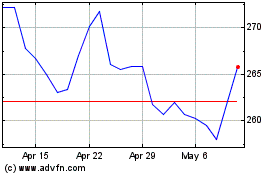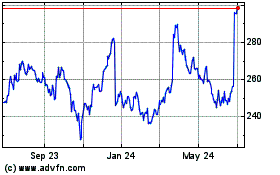FedEx Shares Plummet Following Dismal Results
September 18 2019 - 1:27PM
Dow Jones News
By Paul Ziobro
FedEx Corp. shares plunged the most in a decade after the
company's global Express business showed its vulnerability to
global trade disruptions.
The Memphis, Tenn.-based delivery giant on Tuesday cut its
earnings guidance for the fiscal year citing lower revenue
projections in its Express unit, which ferries packages and cargo
by planes around the world. With weaker macroeconomic conditions
and uncertainty stemming from trade disputes across the globe,
FedEx foresees fewer shipments moving across borders.
"The biggest impact was at Express and that was international
with a large degree of that in Europe," FedEx Chief Financial
Officer Alan Graf said on Tuesday's earnings call.
FedEx shares were down nearly 14% in midday trading Wednesday to
$149.27, on track for its largest one-day drop since 2008. The
decline wiped out more than $6 billion in market
capitalization.
FedEx reported an 11% decline in earnings for its fiscal first
quarter when excluding integration expenses tied to its acquisition
of the European carrier TNT Express. It also cut its profit and
revenue forecasts, projecting per-share earnings to fall by as much
as 29% in the current fiscal year, compared with an expectation of
a mid-single-digit percentage decline issued in June.
FedEx Chief Executive Frederick Smith said Tuesday that the
company had expected a resolution to the U.S. trade dispute with
China as it entered its current fiscal year, but the "return to
normalcy" it hoped for hasn't taken place.
The Express business, the company's largest by revenue, posted a
3% drop in revenue for the quarter, while income fell 27%.
FedEx is trying to cut costs aggressively in the business,
though that won't happen until after the holiday shipping season,
when having that extra shipping capacity is vital due to the surge
in shipments.
Though the Express business is struggling, FedEx continues to
pour money into it, buying new aircraft and modernizing some of its
aging facilities in places like Memphis and Indianapolis with more
automation. Some analysts questioned the wisdom of doing so when
the business is in a down cycle.
FedEx executives defended the spending, projected at $5.9
billion over each of the next two fiscal years, as necessary.
Upgrading the hubs will allow FedEx to process packages faster and
with fewer workers, which are becoming harder to recruit, they said
on the earnings call. Meanwhile, the new aircraft are more
efficient to operate and more reliable, they said.
"The failure to do it is very dire," Mr. Smith said.
Mr. Graf said FedEx has already trimmed its future capital
spending and would consider further cuts if the U.S. enters into a
recession. "We'll definitely cut further," he said.
FedEx's results are also being hampered by the growth of
e-commerce. That trend provides ample volume to fill planes and
trucks but comes with additional costs, like those associated with
a looming rollout of Sunday delivery year round. Online packages
also are generally lighter weight and move shorter distances, so
the revenue per shipment is lower than other shipments that move
through the company's network.
"This is a structural issue, not a cyclical issue," said Satish
Jindel, president of SJ Consulting Inc., a parcel-industry research
firm. "The supply chain is changing."
FedEx is adding new services to cater to that change. It has
started to offer ground shipments where the package only travels
locally, shipping from, say, a Target Corp. store nearby. Mr. Smith
said that while the revenue on such shipments is lower, they have
higher margins because FedEx is now delivering more packages in
neighborhoods. That increased delivery density reduces costs.
"FedEx will be the low-cost, high-service producer," Mr. Smith
said. "You can put traffic in very, very late in the night or in
the morning, and at a lower cost than anybody, and I mean
anybody."
Write to Paul Ziobro at Paul.Ziobro@wsj.com
(END) Dow Jones Newswires
September 18, 2019 13:12 ET (17:12 GMT)
Copyright (c) 2019 Dow Jones & Company, Inc.
FedEx (NYSE:FDX)
Historical Stock Chart
From Mar 2024 to Apr 2024

FedEx (NYSE:FDX)
Historical Stock Chart
From Apr 2023 to Apr 2024
